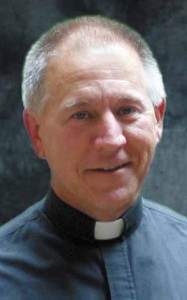By Father Bud Grant

The political polarization that tugs at the fringes of our society distorts seemingly straightforward policy decisions into ideological battle grounds. Take, for example, the U.S. Fish & Wildlife Service proposal to de-list the gray wolf (lupis canis) as an endangered species. As with most environmental issues, this one tells us at least as much about ourselves as it does the problem we are addressing.
A recent news story explored this observation in admirable detail: “in much of the American West,” reporter Nathan Rott observes, “the gray wolf is a political issue as important — and divisive — as gun control, or health care or gay marriage are in other parts of the country.” A young waitress in Gardiner, Wyo., candidly notes that “you can’t be neutral in anybody’s mind, it’s like you have to choose a side … If you say, like, ‘oh I like wolves,’ then someone that doesn’t will be like ‘oh, well then, I have no respect for you’ … there’s nothing else” (http://apps.npr.org/wolves/).
Nor are Christians immune to vitriolic extremism. A sheep rancher who, acting entirely within the law, killed a wolf after his flock had been preyed upon, received death threats and comments such as, “I will pray your family suffers terribly every night for the rest of my life.”
So where does this polarization come from? Mary Midgley, in her insightful work, “Wickedness,” argues that we project our own deeply human flaws onto other species … and the “big bad wolf” of fairy tale is perhaps our most natural bogey man. Midgley and others insist that genuine wickedness is a distinctly human trait triggered by a disorder of our virtues or, more precisely, a lack of a certain essential quotient in our moral reasoning. This lack, says ethicist John Kekes, can be cognitive, emotive or volitional; that is, we can be thoughtless, insensitive or weak-willed (see Diana Cates: “Wickedness,” Iowa Research Online), especially when we are focused only on our own sense of success or, more worrisome, if we feel so marginalized, powerless, humiliated or hopeless that we resort to desperate malevolence … choosing evil even when there is no perceivable advantage to ourselves.
Though this condition of ideological rigidity is relatively rare, it is a more potent stimulus to quick judgment and rash acts than cautious, thoughtful and dispassionate adjudication for the common good. Too often associated with people of faith, ideology is, in fact, the very antithesis of authentic religion. Where the former is blind, closed, rigid, fearful and even violent, the latter is honest, open, hopeful and compassionate. Moreover, religion is bravely informed where ideology is willfully ignorant.
So what are the facts about wolves? Historically, wolves occupied the entire continental United States. Once down to 50 animals, there are now about 6,000. “The restoration of the wolf … is America’s most significant wildlife conservation accomplishment in the 20th century,” says Doug Smith, head of Yellowstone wolf project. There are only three wolf species (the “gray,” “timber,” and “arctic” are all the same species). The Mexican wolf (a sub-species distinguished by ecological separation) remains listed. Wolves are already de-listed in several states in the Northwest and upper Midwest — even in such places as Iowa, where there are no significant wolf populations. Yellowstone is the best place in the world to experience wolves, though 98 percent of the wolves of that ecosystem live outside the park’s borders (significantly, the park constitutes only one-fifth of the ecosystem). Wolf predation of ungulates such as Elk is not impacting populations. Livestock is hunted: in 2012 the federal government paid $100,000 to Idaho ranchers who had lost 71 cattle and 121 sheep. Where licensed hunting is legal only one in a hundred results in a dead wolf.
Such facts are as crucial as bricks are to buildings. Ethical considerations are at least as important: under what circumstances is species extermination morally conscionable? How can we manage ecosystems while also thriving? Who should bear the costs?
(Father Bud Grant is a professor of theology at St. Ambrose University in Davenport.)







